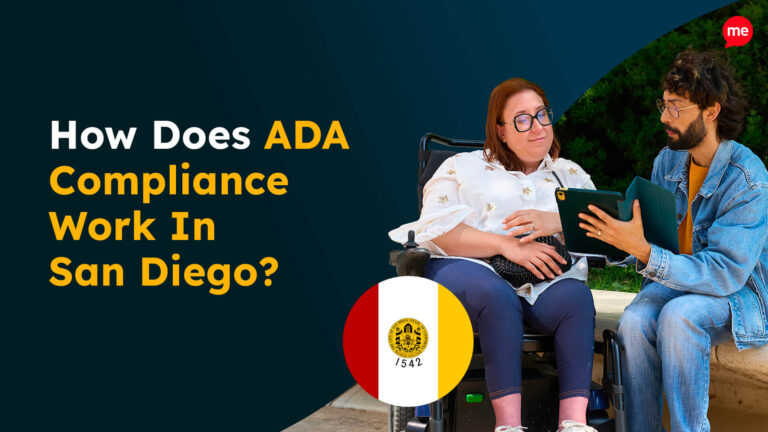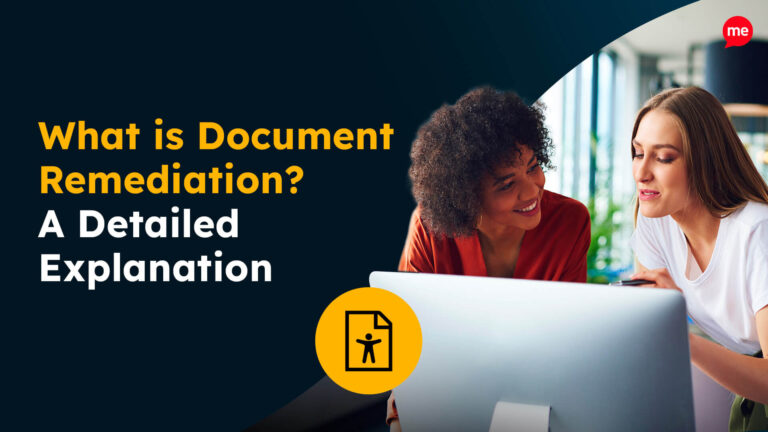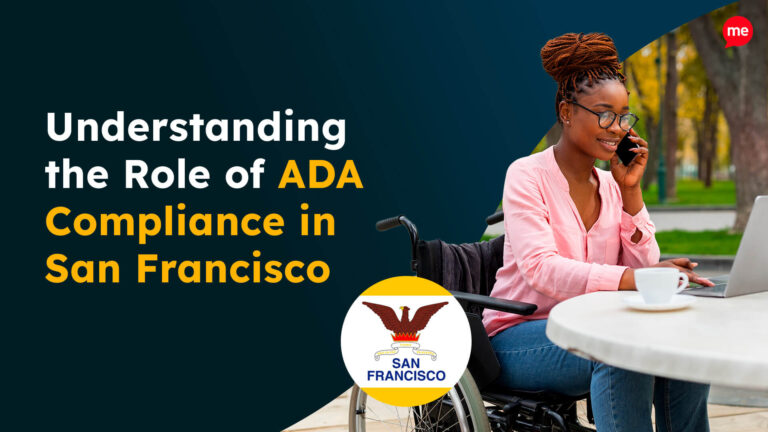Get A Free ADA Compliance Audit Of Your Website
Download NowAccording to US Census data, there are over 10 million residents in Michigan, including 2.3 million adults with a disability. Of course, not all of those disabilities are physical or even obvious, as the broad spectrum of conditions that fall under the general term ‘disability’ include hidden disabilities like vision and hearing deficits, cognitive impairments, and various neurodivergent traits.
The State of Michigan (SOM) has been more proactive than many other states in ensuring sufficient accessibility accommodations for disabled citizens – both in physical spaces and online.
Not sure what to do to make your website compliant? Let’s take a detailed dive into Michigan web accessibility legislation.
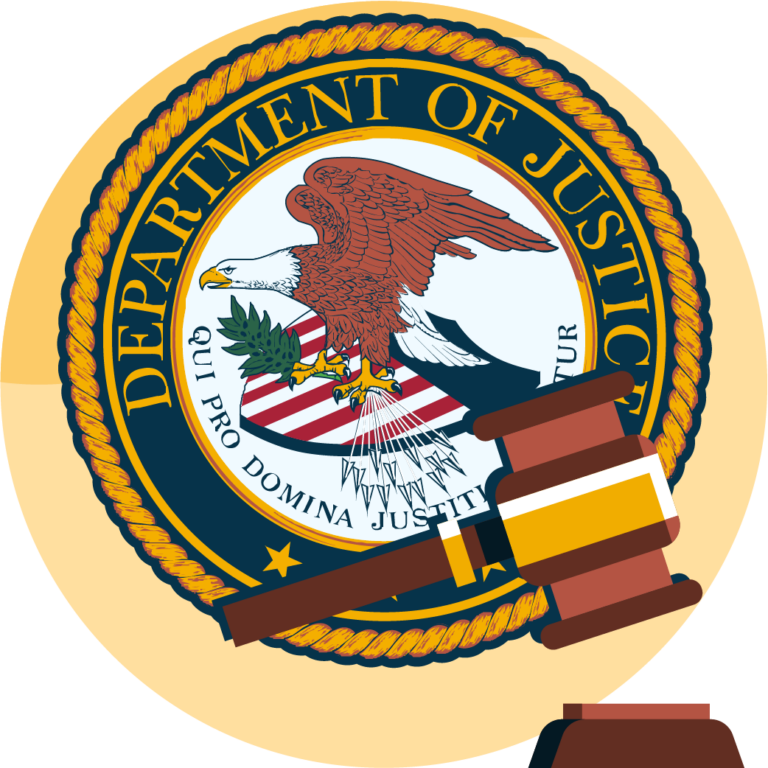
Web Accessibility Laws in Michigan
In addition to pre-existing nationwide legislation, SOM organizations must comply with stand-alone state guidelines to ensure that all citizens, including those with disabilities, have equal access to online apps and resources. Let’s examine each of the relevant laws in more detail.
Michigan-Specific Digital Accessibility Standards
State-specific disability laws in Michigan comprise the Michigan Deaf Persons’ Interpreters Act and the Michigan Persons with Disabilities Civil Rights Act. Combined with ADA and Section 508 provisions (full info on those coming up below), SOM-specific guidance ensures that all state resources are accessible to people with disabilities. The legislature extends to, but is not limited to, equitable accessibility of electronic documents, videos, websites, and mobile applications. Specific compliance criteria depend on when online products and resources were first published.
Web-based Assets Developed After May 31, 2018
There are two sets of guidelines that web-based products and resources need to consider:
- The State of Michigan Digital Standards – Comprising an array of visual, technical, and general accessibility considerations, all public-facing websites and applications utilized by citizens must comply.
- SOM Digital Guidelines – Serving as a standardization document for all State websites, these guidelines serve as a uniform design language to ensure consistent patterns for website and app navigation.
Web-based Assets Developed Before May 31, 2018
As an alternative to Digital Standards and Digital Guidlines compliance, older SOM digital assets can follow the state’s Look and Feel Standards for Web Applications and Sites. These standards and requirements cover:
- Responsive vs. non-responsive design
- Page layout
- Usability and formatting
- Application security
- State of Michigan Internet core policies
- ADA compliance
The Americans With Disabilities Act
Since its inception in 1990, the Americans with Disabilities Act (ADA) has undergone a significant evolution. Initially conceived to address physical barriers, the ADA now encompasses digital spaces, recognizing websites and online platforms as integral extensions of physical environments.
Within the ADA framework, there are five titles covering various aspects of accessibility. While all titles contribute to the overarching goal of inclusivity, only Titles I, II, and III relate specifically to digital accessibility:

- ADA Title I fosters an inclusive workplace environment, mandating that all federal employment information related to recruitment, hiring, promotions, training, and termination be equally accessible to individuals with disabilities.
- ADA Title II addresses the accessibility of public services and programs, emphasizing equitable access to digital information for all members of the community.
- ADA Title III broadens the scope of ADA compliance to encompass public-facing private entities, mandating that comprehensive online access to goods, services, facilities, and accommodations be afforded to all.
Section 508 of the Rehabilitation Act
Section 508 of the Rehabilitation Act covers digital accessibility within federal agencies, mandating that all websites, software, and digital assets utilized by government entities are accessible. The core objectives of Section 508 are to:
- Facilitate Equal Access for Federal Employees – By ensuring those with disabilities enjoy equitable access to information and data, Section 508 strives to eliminate barriers that hinder participation and productivity for employees with disabilities within federal workplaces.
- Promote Public Accessibility to Federal Resources – To the benefit of all members of the public seeking federal information or utilizing government services, Section 508 mandates digital platforms be accessible and navigable by all, regardless of disability status.
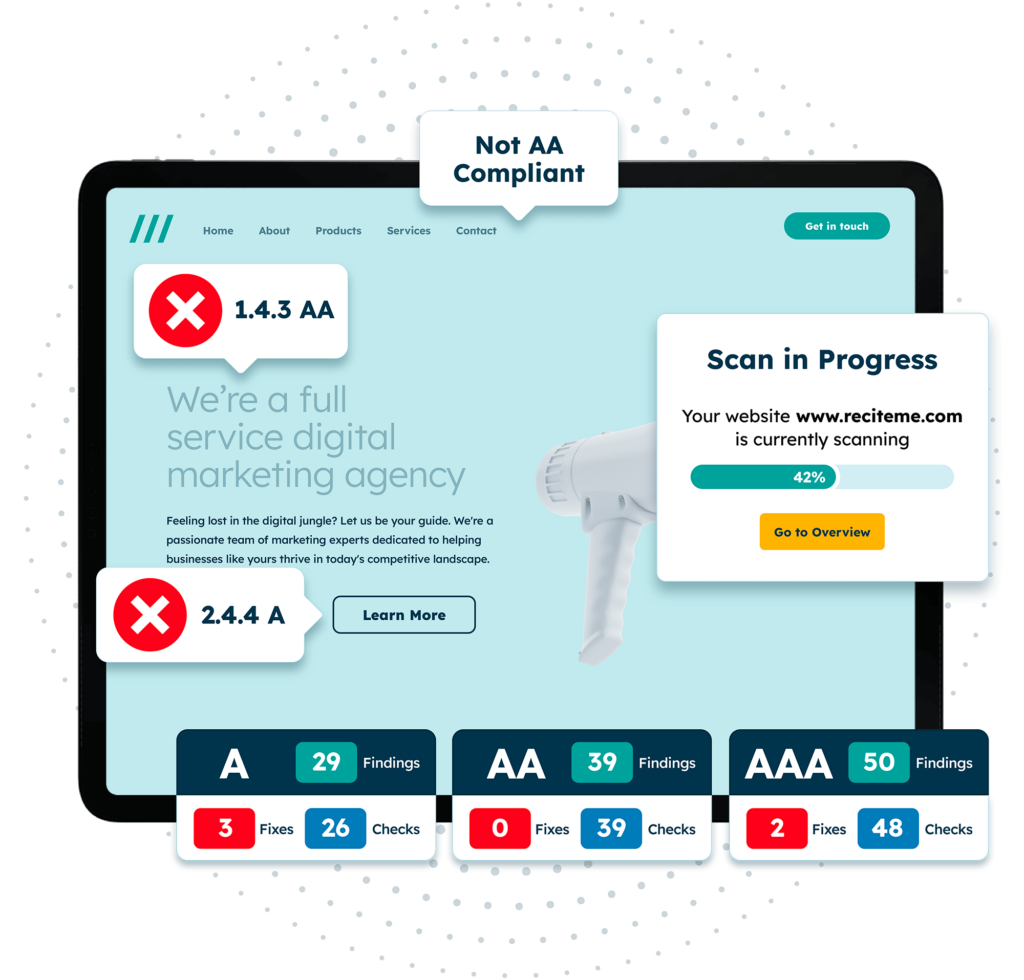
Free Accessibility Check of your Website
Finding accessibility issues is now easier than ever. Recite Me offers a free automated scan of your website’s homepage to highlight non-compliance. You’ll get recommendations on how to fix them, helping to improve your accessibility score.
Which Businesses Do Michigan Web Accessibility Laws Apply To?
Michigan’s web accessibility laws encompass a broad array of entities, and although state-specific guidelines only apply to government agencies at this time, ADA and Section 508 provisions extend legislative reach to include private businesses.
The ADA Title III plays a central role in regulating accessibility for private enterprises. Additionally, Section 508 can impact the following types of organizations:
- Direct and indirect contractors – Any company that engages in contracts or operates within the supply chain of federal or state agencies.
- Non-profit grant recipients – Including charities, conservation groups, research institutions, and community development organizations.
- For-profit entities receiving government funding – Private businesses across sectors like healthcare, finance, education, and transportation.
What are The Risks and Consequences of Non-Compliance?
While there are no set monetary sums for non-compliance with state-specific web accessibility legislation in Michigan, civil action penalties may result in injunctive relief or damages, including reasonable attorneys’ fees and compensation for lost wages.
Violation of ADA or Section 508 standards can expose companies to costly settlements and drawn-out court battles. Plus, organizations receiving government funding risk contract revocation and enhanced regulatory monitoring or scrutiny going forward.
However, the implications of non-compliance extend beyond immediate financial consequences because:
- Inaccessible websites restrict market reach and engagement, potentially leading to revenue loss.
- Non-compliance can tarnish a company’s reputation, resulting in negative publicity and diminished brand loyalty.
- Non-compliance can breed disillusionment among staff members, impacting overall morale and potentially leading to higher turnover rates.
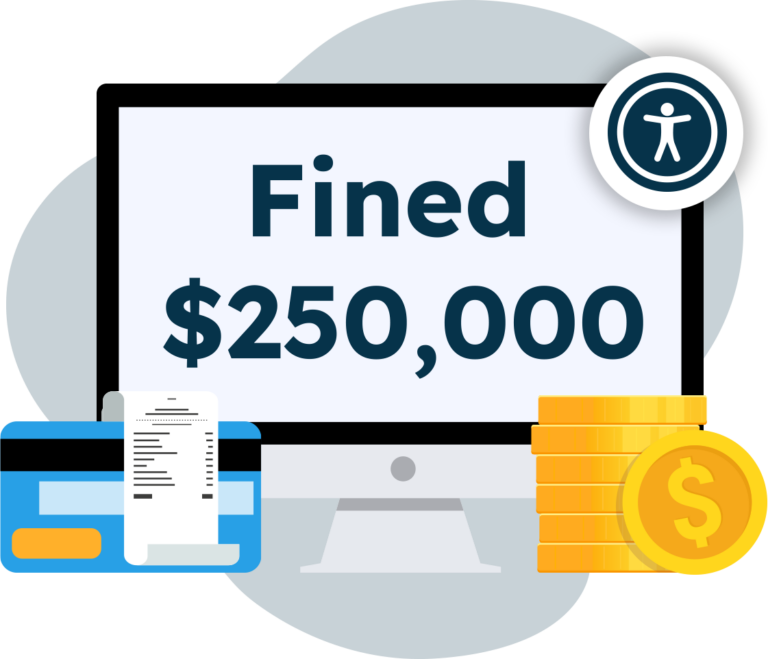
Notable Digital Accessibility Lawsuits in Michigan
While much of the existing legislation may be primarily aimed at federal agencies, Michigan’s digital accessibility court filing records dispel the misconception that only government organizations can be held accountable to web accessibility requirements. Let’s take a look at a couple of notable cases to learn more.
Legal Proceedings Against the State
Case: Powell and Wurtzell vs Michigan State
Plaintiffs: Michael Powell and Fred Wurtzell
Defendants: Secretary of State Jocelyn Benson and Director of Elections Jonathan Brater
During the COVID-19 pandemic, Michigan voters were encouraged to stay home and vote remotely. However, the absentee paper ballots were not accessible to individuals with vision impairments who couldn’t read independently. The lawsuit argued that by being forced to seek assistance, the ability to vote privately was taken away from blind and partially blind Michiganders.
Powell and Wurtzell won the case, and while no specific details are known regarding relief or damages, the State did have to make accessible absentee ballots permanently available to all disabled Michigan voters.
Legal Proceedings Against Private Entities
Case: Hilbert vs Atheneum Hotel Corporation
Plaintiff: Laurel Hilbert
Defendant: Atheneum Suite Hotel
Filed in early 2024, the outcome of this case is yet to be determined as proceedings are still ongoing. However, the premise for court action is that Mr Hilbert, who has been blind since birth, found the Atheneum Suites website insufficiently accessible.
Stay ahead of the game when it comes to Digital Accessibility laws and compliance in the United States. Learn about all the different federal and state-level regulations, see real examples of web accessibility lawsuits in different regions and discover a 7-step action plan for building accessible websites.
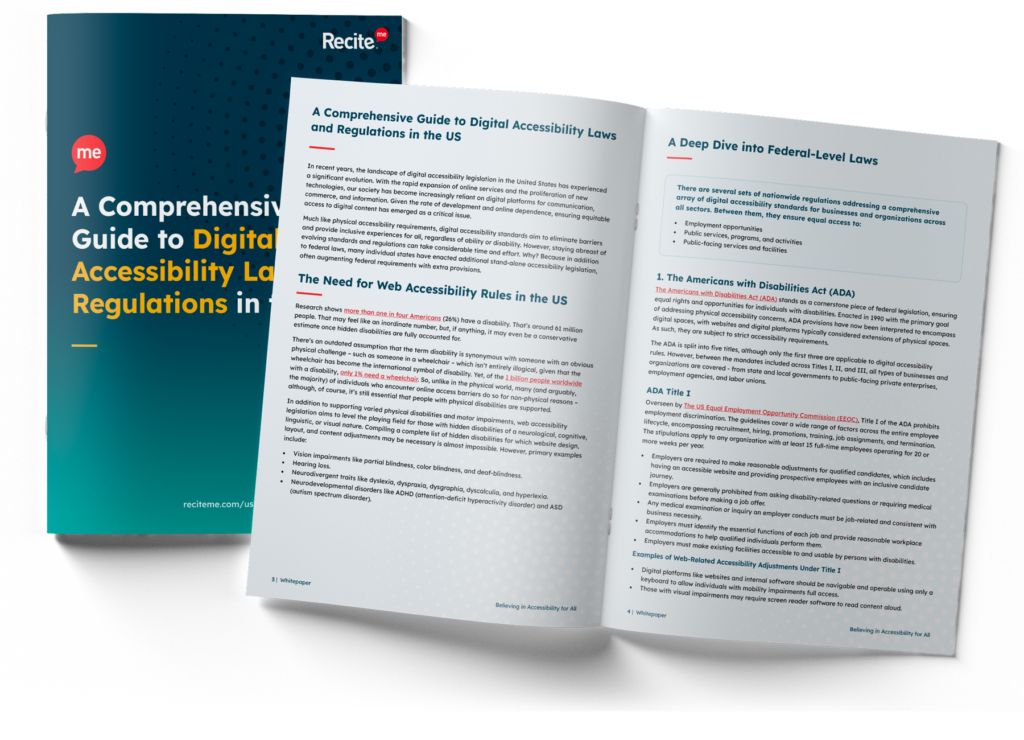
The Importance of WCAG Compliance
All federal and state legislation, including Michigan-specific digital accessibility guidelines, rely on the Web Content Accessibility Guidelines (WCAG) as a foundational framework. Therefore, prioritizing WCAG compliance is a significant step toward fostering an inclusive online environment and mitigating legal risk. WCAG guidelines are organized into different levels of conformance, each indicating the degree of accessibility achieved:
- Level A
- Level AA
- Level AAA
Current obligations specify WCAG 2.0 Level AA compliance. However, as WCAG 2.1 is the most current version – and 75% of all federal claims now reference WCAG 2.1AA – going the extra mile to ensure enhanced compliance is highly recommended.
How to Make Your Website Compliant with Michigan Web Accessibility Laws
Ensuring that websites become and remain compliant is an ongoing process. But help is at hand! With Recite Me’s suite of accessibility-on-demand tools, organizations can scale up compliance efforts with confidence to enhance usability and demonstrate commitment to accessibility for all users.
Step 1: Develop a Compliant Website
The Recite Me Accessibility Checker streamlines the process of ensuring compliance with accessibility standards. With 396 separate compliance scans, our software identifies non-compliance issues and generates a prioritized fix queue based on WCAG criteria. Here’s how it works:
- Scan: Choose to scan a single page for a quick snapshot or multiple pages for a comprehensive view.
- Identify: The dashboard displays an overview of errors, their locations, and guidance on prioritizing fixes.
- Fix: Action items are grouped into priority fix queues based on WCAG criteria, from Level A to AA and AAA.
- Track: Custom reports track progress and provide a roadmap for ongoing compliance fixes.
Schedule a free demonstration or run a free scan today!
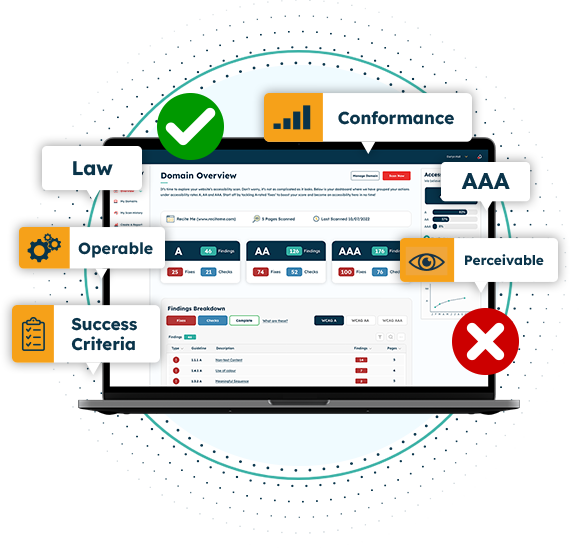
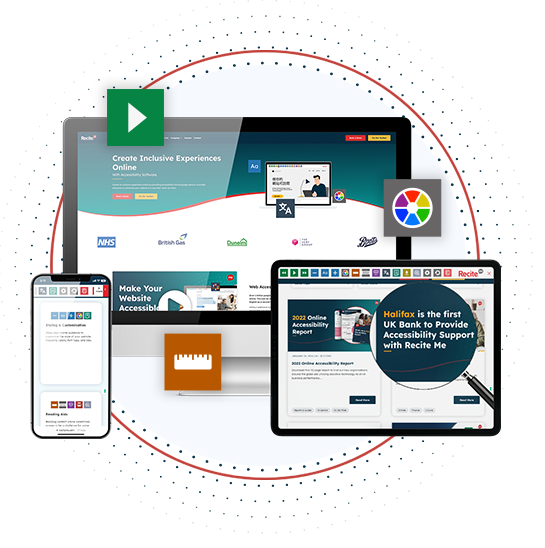
Step 2: Boost Usability for Individual Users
Ensuring compliance s is crucial, but it’s equally important to enhance inclusivity. The Recite Me Toolbar promotes inclusivity by allowing users with various needs and preferences to make adjustments for ease of navigation and content consumption. The toolbar enables customization of:
- Font size, type, and color options
- Color contrast between text and background
- Display language, with over 100 options available
- Consumption methods, such as downloading content as audio files or translating into 65 text-to-speech languages
Additionally, features like the on-screen ruler, mask, zoom function, built-in spell-checker, and integrated dictionary and thesaurus further enhance usability and comprehension.
Schedule a free demonstration, or try the toolbar for yourself!
Step 3: Demonstrate Ongoing Commitment to Digital Accessibility
Displaying an accessibility statement on your website is a proactive step that makes your current and future inclusion goals clear to all. However, writing an accessibility statement takes time and effort. Recite Me’s Free Accessibility Statement Generator simplifies this process by generating tailored statements ready for immediate upload.

